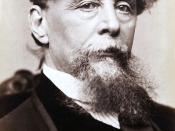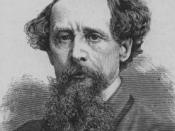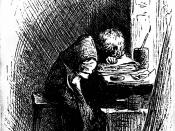Since the beginning of time, it has been impossible for humans to love unconditionally. Even God, the supreme being of the human race, cannot be loved unconditionally by His people unless they totally give themselves to Him and worship Him -- in other words, unless they sacrifice themselves. Considering this, it has been hard for humans to even try to love one another without selfish motives creeping into their unconscious. Likewise, parents and their children do not and cannot share unconditional love. In A Tale of Two Cities, Dickens portrays the ideal of unconditional love between parents and their children when, in fact, it is not a reality.
I have always thought of my relationship with my father as a good one until I understood the true role he is supposed to have. My dad has constantly been more like a friend to me than a parent. He, as my father, has an obligation to be nurturing, to take care of me, to take responsibility for his mistakes, to help me in times of need, and to support me financially.
These are all things of which he has not yet proven to be capable. I recall a period of time, for example, when I was about seven years old: my mother instructed him to pick me up from school, feed me, watch me for a couple of hours, and then take me back to school. Instead of doing so, he left me alone in front of my school countless times starving, waiting for what seemed like forever and wondering where he was. Not wanting my mother to find out about these times because of his unwillingness to take responsibility, he bribed me with candy and ice cream to keep my mouth shut. So he did this, and the ideal...


